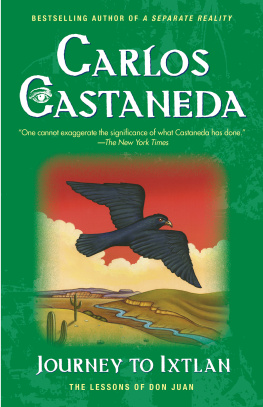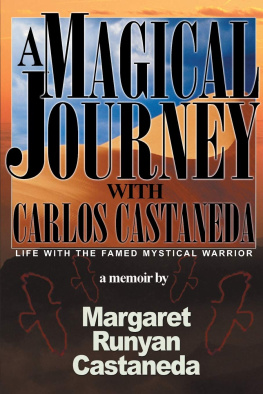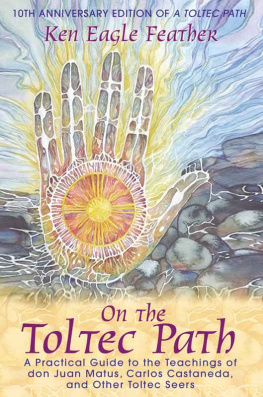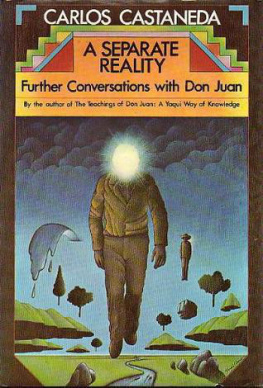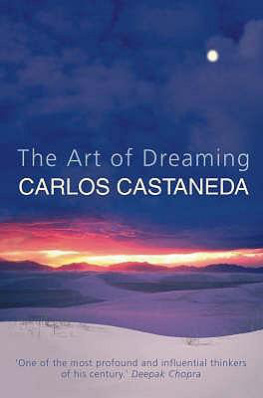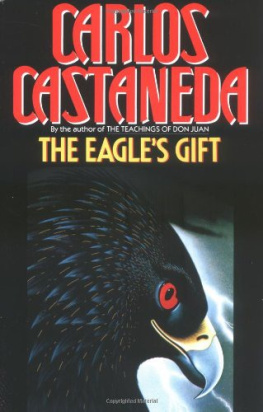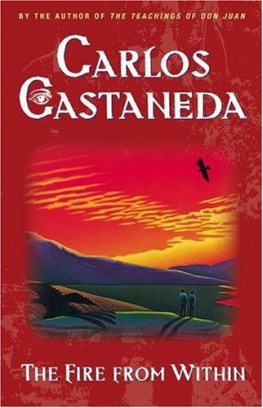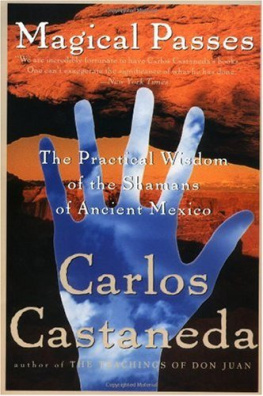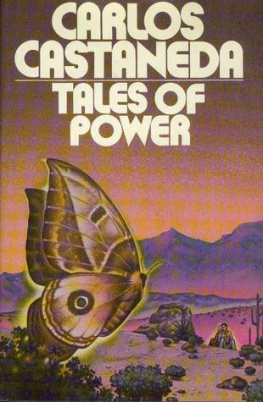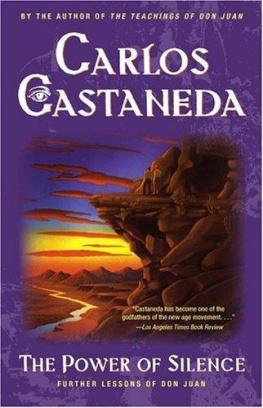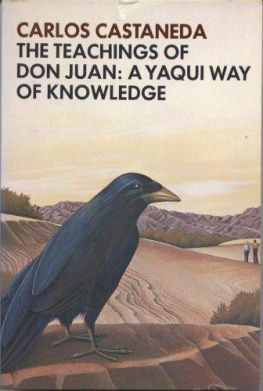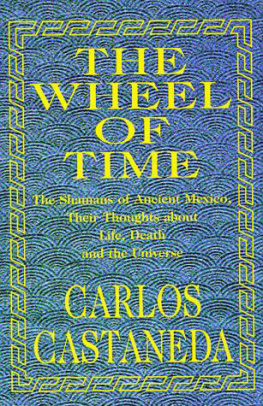LOOK FOR THESE INFLUENTIAL BOOKS BY BESTSELLING AUTHOR CARLOS CASTANEDA
_______________
THE TEACHINGS OF DON JUAN
A Yaqui Way of Knowledge
A SEPARATE REALITY
Further Conversations with don Juan
JOURNEY TO IXTLAN
The Lessons of don Juan
TALES OF POWER
THE SECOND RING OF POWER
THE EAGLES GIFT
THE FIRE FROM WITHIN
THE POWER OF SILENCE
THE WHEEL OF TIME
The Shamans of Ancient Mexico, Their Thoughts about Life, Death and the Universe
Available from Washington Square Press


A Washington Square Press Publication of
POCKET BOOKS, a division of Simon & Schuster Inc.
1230 Avenue of the Americas, New York, NY 10020
www.SimonandSchuster.com
Copyright 1972 by Carlos Castaneda
All rights reserved, including the right to reproduce this book or portions thereof in any form whatsoever.
For information address Simon & Schuster Inc., 1230 Avenue of the Americans, New York, NY 10020
ISBN: 0-671-73246-3
ISBN: 978-1-4391-2184-9 (ebook)
First Washington Square Press trade paperback printing February 1991
WASHINGTON SQUARE PRESS and colophon are registered trademarks of Simon & Schuster Inc.
For me the world is weird because it is stupendous, awesome, mysterious, unfathomable; my interest has been to convince you that you must assume responsibility for being here, in this marvelous world, in this marvelous desert, in this marvelous time. I wanted to convince you that you must learn to make every act count, since you are going to be here for only a short while; in fact, too short for witnessing all the marvels of it .
Don Juan
We are incredibly fortunate to have Carlos Castanedas books. Taken together, they form a work which is among the best that the science of anthropology has produced. The story they tell is so good, and the descriptions so vivid, that I was utterly fascinated as I read.
Paul Riesman, The New York Times Book Review
Staggeringly beautiful reading. Itself timeless, Journey to Ixtlan is one of the important statements of our time.
Barry Corbert, Book World
Books by Carlos Castaneda
THE TEACHINGS OF DON JUAN:
A Yaqui Way of Knowledge
A SEPARATE REALITY:
Further Conversations with Don Juan
JOURNEY TO IXTLAN:
The Lessons of Don Juan
TALES OF POWER
THE SECOND RING OF POWER
THE EAGLES GIFT
THE FIRE FROM WITHIN
THE POWER OF SILENCE
Published by WASHINGTON SQUARE PRESS
CONTENTS
PART ONE
Stopping the World
PART TWO
Journey to Ixtlan
INTRODUCTION
O N S ATURDAY , M AY 22, 1971, I went to Sonora, Mexico, to see don Juan Matus, a Yaqui Indian sorcerer, with whom I had been associated since 1961. I thought that my visit on that day was going to be in no way different from the scores of times I had gone to see him in the ten years I had been his apprentice. The events that took place on that day and on the following days, however, were momentous to me. On that occasion my apprenticeship came to an end. This was not an arbitrary withdrawal on my part but a bona fide termination.
I have already presented the case of my apprenticeship in two previous works: The Teachings of Don Juan and A Separate Reality.
My basic assumption in both books has been that the articulation points in learning to be a sorcerer were the states of nonordinary reality produced by the ingestion of psychotropic plants.
In this respect don Juan was an expert in the use of three such plants: Datura inoxia, commonly known as jimson weed; Lophophora williamsii, known as peyote; and a hallucinogenic mushroom of the genus Psilocybe.
My perception of the world through the effects of those psychotropics had been so bizarre and impressive that I was forced to assume that such states were the only avenue to communicating and learning what don Juan was attempting to teach me.
That assumption was erroneous.
For the purpose of avoiding any misunderstandings about my work with don Juan I would like to clarify the following issues at this point.
So far I have made no attempt whatsoever to place don Juan in a cultural milieu. The fact that he considers himself to be a Yaqui Indian does not mean that his knowledge of sorcery is known to or practiced by the Yaqui Indians in general.
All the conversations that don Juan and I have had throughout the apprenticeship were conducted in Spanish, and only because of his thorough command of the language was I capable of obtaining complex explanations of his system of beliefs.
I have maintained the practice of referring to that system as sorcery and I have also maintained the practice of referring to don Juan as a sorcerer, because these were categories he himself used.
Since I was capable of writing down most of what he said in the beginning of the apprenticeship, and everything that was said in the later phases of it, I gathered voluminous field notes. In order to render those notes readable and still preserve the dramatic unity of don Juans teachings, I have had to edit them, but what I have deleted is, I believe, immaterial to the points I want to raise.
In the case of my work with don Juan I have limited my efforts solely to viewing him as a sorcerer and to acquiring membership in his knowledge.
For the purpose of presenting my argument I must first explain the basic premise of sorcery as don Juan presented it to me. He said that for a sorcerer, the world of everyday life is not real, or out there, as we believe it is. For a sorcerer, reality, or the world we all know, is only a description.
For the sake of validating this premise don Juan concentrated the best of his efforts into leading me to a genuine conviction that what I held in mind as the world at hand was merely a description of the world; a description that had been pounded into me from the moment I was born.
He pointed out that everyone who comes into contact with a child is a teacher who incessantly describes the world to him, until the moment when the child is capable of perceiving the world as it is described. According to don Juan, we have no memory of that portentous moment, simply because none of us could possibly have had any point of reference to compare it to anything else. From that moment on, however, the child is a member. He knows the description of the world; and his membership becomes full-fledged, I suppose, when he is capable of making all the proper perceptual interpretations which, by conforming to that description, validate it.
For don Juan, then, the reality of our day-to-day life consists of an endless flow of perceptual interpretations which we, the individuals who share a specific membership, have learned to make in common.
The idea that the perceptual interpretations that make up the world have a flow is congruous with the fact that they run uninterruptedly and are rarely, if ever, open to question. In fact, the reality of the world we know is so taken for granted that the basic premise of sorcery, that our reality is merely one of many descriptions, could hardly be taken as a serious proposition.
Fortunately, in the case of my apprenticeship, don Juan was not concerned at all with whether or not I could take his proposition seriously, and he proceeded to elucidate his points, in spite of my opposition, my disbelief, and my inability to understand what he was saying. Thus, as a teacher of sorcery, don Juan endeavored to describe the world to me from the very first time we talked. My difficulty in grasping his concepts and methods stemmed from the fact that the units of his description were alien and incompatible with those of my own.
Next page
